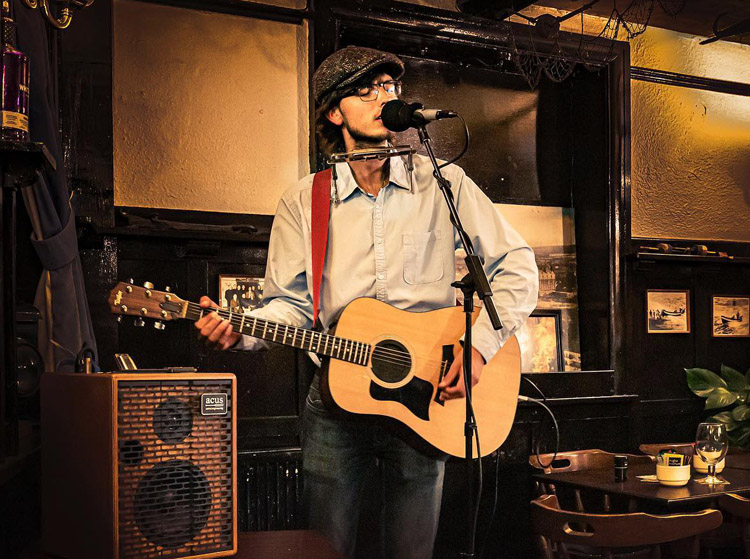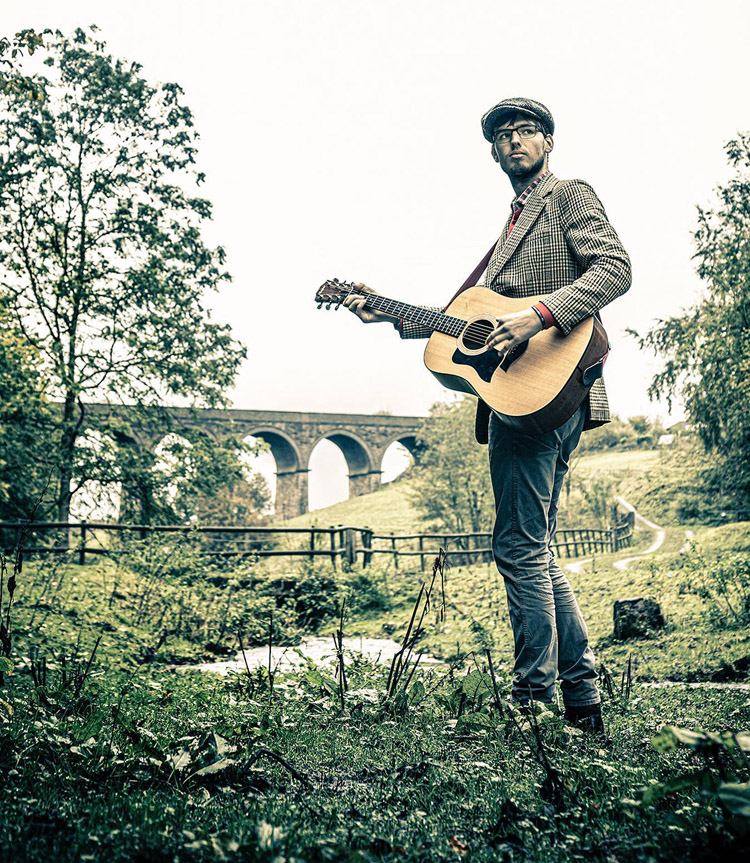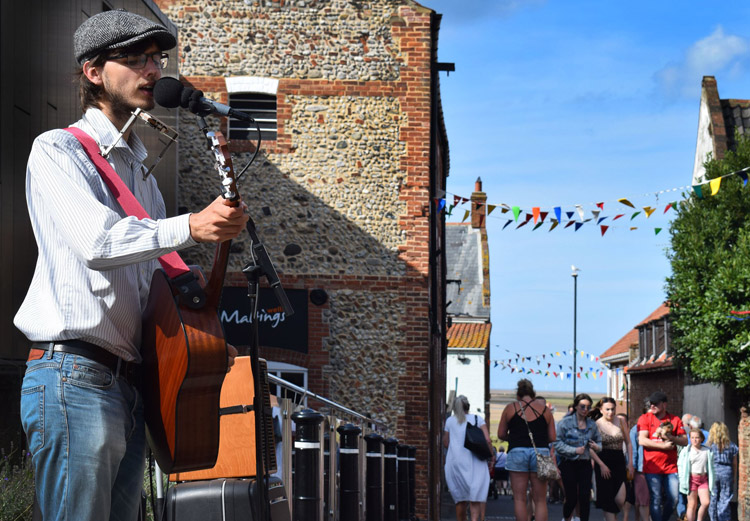Tom Hillen
 Sure. I’m twenty, and I’m Dutch, born and raised in
Kolderveen, near Nijeveen, a
little village – up North, not Amsterdam! My interest in music started when I
was about twelve or so, at school, and one of my teachers was really into Bob
Dylan. And when I got home my Dad said, ‘Let me get you to hear some proper
music,’ and he let me hear Mark Knopfler. So it grew from there.
Sure. I’m twenty, and I’m Dutch, born and raised in
Kolderveen, near Nijeveen, a
little village – up North, not Amsterdam! My interest in music started when I
was about twelve or so, at school, and one of my teachers was really into Bob
Dylan. And when I got home my Dad said, ‘Let me get you to hear some proper
music,’ and he let me hear Mark Knopfler. So it grew from there.
Procol fans who read Facebook know you as a street busker. You play electric as well?
Yes, electric guitar as well. The main interest was always electric, but at some point I got into acoustic because it’s such a good writing tool. And it works really well when you want to perform on the street.
I love the guitar, but it slowly developed into songwriting, so I guess you could say that’s my main thing now. I’m now working on some original material, and planning to make an album which will show a bit of harmonica playing and a mix of acoustic and electric guitar – so that people know a bit more of what I’m into and what I can do.
Will you be playing everything yourself?
No, I’m not a multi-instrumentalist: I’ve got a drummer who is really good, and a friend of mine plays bass. My thing is harmonica, singing and guitars.
It’s remarkable for long-time fans to know that a musician born in the 21st century is into Procol Harum. And even more remarkable, you’ve become known for starting out with the band’s least-popular album, and the number from it that most fans like least.
Really? They don’t like it?
If they do like it, it’s probably the music they lean towards, not the words. And remarkably your version uses all the words … and none of the music!
Well that’s interesting, because I love the words really. In 2018 I started an English teachers’ course at Windesheim University (I dropped out the same school year), and we had an exercise for a drama class where we had to perform a story; and everyone just told a story, and that was that. But I browsed through the collection of my dad and he always seem to like this record, Something Magic. It was really special to him, so I listened to that … and I really liked the combination of the music and the words, how they fitted so well together with an interesting arrangement, and I thought this would perfectly go together with my drama exercise; and so I developed it, and then I thought ... well why not busk this as well?
Where did you go on your British busking tour?
This was 2019. I started in Cambridge, then I went to Norwich, then Sheringham …
The low-lying bits of England that Dutch engineers helped us rescue from the sea, by building drainage ditches!
I was surprised to find out how my music was much better received in those friendly towns and villages as opposed to the big cities. I did go all the way up the coast to York, and I went to Newcastle for a bit, but that wasn’t really my cup of tea, so to speak. I like the countryside! So I came back to Wells-next-the-Sea.
And why England? Is it because you sing in English? It’s conspicuous that you speak fantastically fluent English … no trace whatever of an American accent, or inflection.
Well most people in the Netherlands grow up on American movies etcetera but I grew up on things like All Creatures Great and Small, James Herriot, and John Cleese, and things like that were always lying about on DVD. And then Mark Knopfler, Gilbert and Sullivan, etcetera etcetera, and somehow you fall in love with the country. I can’t explain it. Can you explain love?
What kind of reactions have you had, on the road, to The Worm and the Tree?
One thing I’ve had quite a bit is that you finish one section and people start to applaud, think it’s all over, and then it moves into another section; so that’s quite funny, but it’s all right. People are quite surprised, really, that I would busk such a song, because most buskers go for Adele, really popular songs, mainstream music.
Dylan of course, fantastic busking stuff …
So to choose a long, obscure song that no one knows is a bit strange for a lot of people. But this feels like I’m staying true to myself, because I find it hard to do cover versions that everyone else does; you have to have a connection with the music you select.
 How does your Worm relate to your own
compositions?
How does your Worm relate to your own
compositions?
Well the vocal style relates directly, because the conversational singing style, that’s what I do
Which goes back to Mark Knopfler particularly …
And Bob Dylan, and Tom Waits I’d say, and a few more … like Leonard Cohen.
But not Gary Brooker ...
There’s a bit of Tony Joe White in there, and I like that style so I try to incorporate it into what I do as well. It’s all kind of influences, and there’s also a bit in my Worm that I took – a chord progression that I came up with – that I’ve now used for one of my own songs as well. The beginning is a bit Tony Joe White like, and also the end; so it’s really a mix of a lot of things.
Keith Reid recently told me that he feels The Worm and the Tree came out on record very overblown. Looking at the words today, he wonders if it ‘maybe should’ve been one of those old folkie folk ballads.’ So I’m looking forward to drawing his attention to your treatment of the words.
Cool!
And Gary Brooker has stated on many occasions that it was never conceived as a spoken word piece. It’s just that it was arranged and recorded in a rush, before he had time to sort out vocal melodies. So your take on the song may be of interest to him as well. Shame you didn’t see Procol Harum at Zwolle, about ten miles from your house, a couple of years back.
I didn’t know they were around, to be honest with you. But I was interested to read in the documentation on this album about the separation between the lyricist and the music. With me, it happens simultaneously. I’ve tried to split it up, first coming up with the music and then with the lyrics, but for me it’s a combination. It’s quite seldomly that a piece of music gets me to the writing table, it’s always something I want to express in words. And then I’m really eager to complement the words with suitable music.
How do you feel your Worm music relates to the original?
Well I’ve broken it into sections, which is also what you hear on the original (when you listen, you can tell it’s not a live thing in the studio). But another factor is, I think I’ve become more and more interested in the arrangement of a song, not just like Bob Dylan having ten verses or so, and just replaying the arrangement, spitting out the lyrics, but the combination of an interesting arrangement with interesting lyrics. That’s what really attracted me to the Procol album, Something Magic, and also this particular song.
So you didn’t consider approaching it in the manner of Sad-Eyed Lady of the Lowlands, where you would’ve used the same tune over and over again?
Yeah because I felt like, if you do that it might be interesting lyrically – it is interesting lyrically – but it needs a bit more. There is this arranging rule where it says that you should only state something twice in the same manner, and the third time you need to change something. And here you have seven verses: so to keep it interesting you have to change things up a bit, and when I’m on the street I can’t bring a bass or drums, so you handle things in a different way: you do two verses in a blues style, then go into another progression. You have to find different ways to spice it up when you’re using just one guitar.
Where does that repetition rule come from?
If you do a bit of research on the Internet you start to recognise things, and you learn about song structure, and that people are simply accustomed to hearing things change, and don’t expect to hear the same thing over and over again. And that’s why Bob Dylan isn’t so commercial, with his straightforward arrangements: everything really is happening in the lyrics. So this is just something that I’ve picked up and it’s become part of my musical development at the moment. If I was doing this with a full band in the studio, I might stay with the same music and vary it by adding instruments. But when you have a small set of ingredients you have to find other ways to keep it worthwhile. Because it’s a six-minute arrangement …
About a third of the length of the Procol original!
True, but it’s also about twice the length of the average pop song!
And are you combining music with a day job?
No, at the moment I’m still living with my mum and dad, so that’s not really rock’n’roll [laughs]. I’m really working on the album now. I finished the English teacher course, but it wasn’t really my thing. I love the English language, and culture, and I wanted to do something with that. When I quit school I just went to England to do the busking, but that’s over for now, because of Covid. So of course I thought, let’s make the best album ever, get some CDs out, proper artwork and everything, and then hopefully next year do a real tour of half a year or even longer. I know what I want in music, but I’m not really a commercial someone.
Well I have to say, I don’t think a ‘commercial someone’ would probably start with The Worm and the Tree.
[Laughs]
I was a teacher for many years, mostly English, bit of Music, and I think my enthusiasm for Procol is deeply bound up with a love of words. And probably the reason most Procol fans don’t really warm to The Worm is partly because the words seem relatively two-dimensional compared with the rich imagery in a lot of the other material. But to be fair to Keith Reid, it was an experiment: and you can't expect all experiments to work brilliantly.
 I can see what you mean. It’s not
intellectualised in any way, it’s somewhat straightforward. But I can see it all
in front of me: I like that, as opposed to a lot of songs where they say ‘I
loved you, then I left you’, and things like that. With this piece you can see
it all happening in front of you.
I can see what you mean. It’s not
intellectualised in any way, it’s somewhat straightforward. But I can see it all
in front of me: I like that, as opposed to a lot of songs where they say ‘I
loved you, then I left you’, and things like that. With this piece you can see
it all happening in front of you.
Another thing Keith told me is that he always imagined it having some kind of visual presentation. They played it at the Hammersmith Odeon with a specially-made slideshow, but apparently it was so terrible they dropped it. Certainly it had gone by the time I saw that tour, in March 1977.
Well I think you can spoil things by adding a video format. You have the music, you have the words, and sometimes you can spoil the imagination of the individual listener, or portray something completely different from what the listener would be thinking about. It’s like a book adaptation, where the film spoilt it.
So what other Procol Harum tunes do you like, or listen to? Do you have any other busking pieces of theirs?
Well I haven’t learnt this song yet, I don’t know how I came across it: possibly a YouTube recommendation. But it’s A Whiter Shade of Pale, and it was quite a successful song. I really love that tune. The organ was quite special to me when I first heard it; you don’t hear it that much more in music, such a dominant organ.
Well people do busk A Whiter Shade of Pale: it still comes over well without the organ. But if I’d seen a YouTube clip of you playing that, however good it was, I don’t think we would be having this conversation now.
Procol Harum have quite a lot of other tunes which I need to pick up. This album, Something Magic, it’s the only one of theirs in my dad’s record collection, and I’ve been looking and listening to it a lot. The interesting thing is that my dad said, ‘When I bought it, I felt like it was a special edition or something, because never ever afterwards I saw it anywhere else, and felt maybe it was a fan edition or something?’
That’s so interesting, because of all the 'Old Testament' albums, it is the one that was least successful at the time, and the one most fans still like to marginalise. Are you aware of In Held ’Twas in I?
I don’t know that one.
It’s another seventeen-minute piece, very influential, and critics have tended to claim that The Worm and the Tree was some kind of attempt to revisit that 1968 masterpiece.
Yes, I’ve read that.
But the similarities are negligible, apart from the length. One key difference is that In Held is predominantly a first-person narrative, a kind of log of various existential dilemmas.
Yes that’s unusual now! I’ll look it up.
If you go out busking with The Worm and the Tree and In Held ’Twas in I, I think you’ll be the most unusual show on the road. I’ve added your YouTube clip to this feathure. I wonder if you have a home recording of it as well?
I’m afraid not, though I could make such a video. But in a live performance, there is more feel to it, as I was busking in a live setting, as opposed to a video of me in my room. A lot of people start out in music by putting little clips on YouTube, when they’re in their room, but then you can do retakes and retakes. It’s a bit like comparing a live recording to a studio recording. I have tweaked the arrangement a bit since that YouTube performance, but on the whole, it is still basically the same thing.
Who filmed that performance in Norwich? You were touring on your own, I think.
It was someone I met, from a local church there. You can’t trust just anyone with your mobile phone, can you?
Does it strike you that there's a hint of Christian symbolism in The Worm?
[Pause] Not per se …
The death of the tree redeems the forest, the resurrection at the end?
It could be that, but I’d say it’s more just a matter of life: everything that’s new, the relationship between the past and the present and future, it’s just a song about life.
Do you have any thoughts about ‘the young man’ who came riding? We hear ‘tree’ a dozen times, and ‘worm’ fifteen, but only two mentions for ‘man’, the agent who brings about the climax, the only dramatic action.
I don’t really want to specify that too much, I’d leave it open. I see the whole forest, all the creatures – the birds, the foul creature, the hacking of the tree, the fire. It’s a bit fairy-tale like, that’s what’s in my mind when I perform.
Keith Reid told me he didn’t particularly read fairy-tales as a child. The one literary influence he mentioned was an 1823 novel by Sir Walter Scott. But it’s an experiment: I think he regards songwriting as a bit of a collaboration with chance.
That really makes sense to me.
What themes are we going to hear in your own work?
 Loneliness is a topic which I delve into; I
write about life, and suicide. Things that come on my path, alcoholism, all
sorts, being happy, living in the present moment, accepting life as it is, the
importance of money to lots of people, love …
Loneliness is a topic which I delve into; I
write about life, and suicide. Things that come on my path, alcoholism, all
sorts, being happy, living in the present moment, accepting life as it is, the
importance of money to lots of people, love …
Big topics! All in English?
I always write in English. (Listen to radio interview 24 July 2020: What is Love? and Don't Judge a Book by its Cover)
And as a non-native speaker, did you find any of the words in The Worm and the Tree obscure?
‘The worm burst asunder’. ‘Asunder’ was a new word to me, I had to look that up. But I think that most of the words were not too advanced, it was do-able for a non-native to understand the meaning. I love that phrase, ‘rotten and rife’.
Reid seems to have a liking for archaic words, or he’ll reuse a word like ‘rife’ in a way it’s not normally used – quite a fluid approach – and we have to ascribe a new meaning to a word, working it out from the context.
So you played The Worm and the Tree in Denmark in 2006?
That was The Palers’ Band: about twenty-two people, who came together from all nations when Procol were playing two big orchestral shows. Each night they came over to our party after their gig, had some food, and listened to the amateurs. One night we played In Held ’Twas in I – among many other songs. And the next night we played The Worm and the Tree, with multiple narrators, probably the only amateur performance ever with full band. At the end Gary told the audience ‘I didn't realise it was such a great piece of music!’ (soundclip here) And he told Procol, ‘we'll play it again’, and there was a bit of groaning! The piano part is quite involved … took me a little while to learn that. There’s also an interesting Worm treatment on one of the Palers’ Project albums.
Yes I heard that. I don’t want to offend no one, but to me it feels like a radio edit. It’s like the same themes he’s used, but it feels a bit hasty. If he had stretched it to just about five minutes then he would’ve succeeded for my money. I think in this song you really need to absorb the story and that requires a certain length. I don’t think it really works as a short piece.
Arguably your reworking is more in the spirit of the radical versions you find on The Palers’ Project 2CDs.
Yes I wouldn’t mind contributing myself, when you make the fourth 2CD.
I fear the time of CDs is over, really. When we started selling these CDs, it was three years before YouTube started, and CD was still the medium of choice. It would be nice to have an online Palers’ Project, but the original agreement with Gary and Keith was that we’d be circulating these unusual versions among fans, people who already know the proper versions very well. Nobody would be well served if we put the tracks online and newcomers thought they were ‘the real thing’ in any way. You know, the Palers’ Band has performed with Gary Brooker as guest vocalist a few times, and when you see that up on YouTube, captioned as ‘Procol Harum’ … it’s so misleading. There’s no value to anyone in blurring the line between amateur and professional. It’s the last thing I want to do.
As I’ll be in the studio anyway. I could do a live version of the track as I would busk it, no click-tracks or overdubs or drums, keep the live feel, just a better sound quality.
And that wouldn’t take you too long?
Well, I’m a perfectionist, you know …
I’d like to hear that. And it could make a good YouTube item, reach a lot of people. Just this month I put up a clip of something I’m involved with, a one-off rehearsal, and it got 500 YouTube hits within a few days. I know that's not exactly Ed Sheeran territory, but it amazes me what a reach YouTube has, and how quickly word gets around. Compare that with the cost of making and mastering 500 CDs, and designing good artwork … and then selling them over a period of six months, if you’re lucky. And we shouldn’t be adding to the amount of plastic in the world! Maybe I shouldn’t be saying this to someone who’s involved in writing and recording his own CD? But the question remains, though, do you feel a kindred spirit in The Palers’ Project tracks you’ve heard?
Tell you what I liked, I liked Pilgrim’s Progress, sung by Anne Cunningham. It reminds me of certain gospel singers of the '90s. I didn’t pay much attention to the lyrics, because, although I really care about lyrics, when I listen to new music I first want to be inspired or moved by what I hear; after all, it’s about music. And I felt this one, the emotion was real, and I liked the vocal quality of her. It seems she has a true identity to the way she sings, And I really didn’t feel that with all the performances, to be honest [laughs]. Can I name another one?
Go ahead.
Every Dog Will Have his Day. I listened to that without having first listened to the original version, and I must say I preferred the version by The Basement Apes to the Procol Harum one. And when I looked it up on the website I found that you were involved in that one, bass and organ,
The idea of that was, simply, to sound a bit like early-period Dylan, so if you find mistakes on the bass I’m deliberately reflecting the situation on so many of those Blonde on Blonde tracks where the backing musicians hadn’t really been rehearsed, and they’re trying to guess where the changes come.
And you have succeeded, I think.
Admittedly it’s done by remote multi-tracking, but all the performances are one take. No MIDI or clever jiggery-pokery.
I wouldn’t say the harmonica is exactly how I would do it, but there is no doubt the emotion is there
Do you play chromatic harmonica?
No I don’t actually, I’d say that's something you would go for if it was your sole instrument. For me it’s just a thing in a rack; I really care what I do with it, and what I add – in the harmonica playing – to the song, but for me the diatonic instrument seems to work. You can go for a bit of blues, a bit of rock, a bit of folk. It’s diverse enough for me
A friend once tried to convince me that 'it’s not hard to play harmonica as well as Dylan, if you actually own a harmonica'. But the fact is the early electric Dylan was a very big influence on Procol Harum in their formative days. And that’s what The Basement Apes are trying to bring out in this interpretation a very late Procol track./
 Yes,
though I
felt with some of the other songs that, if you take the original in a new
direction just for the sake of it, it doesn’t make a lot of sense. But I do like
the idea that fans feel free enough that they can do whatever they like with
songs they obviously love. If you listen to Beatles covers, they’re usually
done very
straightforwardly, but here, people just make it their own. I wasn’t charmed
per se by all their versions. The one I like best was the one with the
really English voices,
Nothing But the Truth.
Yes,
though I
felt with some of the other songs that, if you take the original in a new
direction just for the sake of it, it doesn’t make a lot of sense. But I do like
the idea that fans feel free enough that they can do whatever they like with
songs they obviously love. If you listen to Beatles covers, they’re usually
done very
straightforwardly, but here, people just make it their own. I wasn’t charmed
per se by all their versions. The one I like best was the one with the
really English voices,
Nothing But the Truth.
John and Harry Oakes, the Cockney twins?
Yes! And all the swear words like 'flipping' and 'bleeding' and 'Gordon Bennett'. I’m not sure that is necessary, or really contributes musically, but it was entertaining.
And I think the key thing is it sent you back to the original.
Yes it certainly sent me to listen to the original. But concerning that song I go for the version on the Palers' Project again. It’s more original!
I’m not sure it can be 'more original', when it is derivative from the actual original?
But how original is that original piece?
Two different meanings of the one word. Your version of The Worm and the Tree, it’s nothing like 'the original', but it is 'original' in the sense that you have not taken any cue from Gary Brooker’s huge contribution to the track. Some would say that your version is a rejection of the original music, whereas even the most extreme Palers' Project tracks are an affectionate acceptance of the records we all grew up with?
Well, let's see if I can make a recording of The Worm and the Tree. Probably some time in the New Year.
And you’ll let us know? 'Us' being all the people who will have read this article.
I certainly will!
Thanks, Tom!
More features at 'Beyond the Pale' | The Palers' Project | Words of The Worm and the Tree | Tom Hillen's music page
|
|